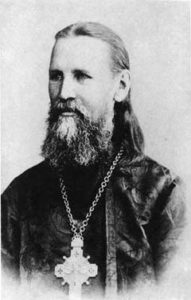SSCORRE!
Saint Sophia Cathedral
Online Resources for our Religious Edification

Topic of the Week – Without Christ, Everything is in Vain“Fasting, prayer, alms, and every other good Christian deed is good in itself, but the purpose of the Christian life consists not only in the fulfillment of one or another of them.
The true purpose of our Christian life is the acquisition of the Holy Spirit of God. But fasting, prayer, alms and every good deed done for the sake of Christ is a means to the attainment of the Holy Spirit. Note that only good deeds done for the sake of Christ bear the fruit of the Holy Spirit.
Everything else that is not done for the sake of Christ, even if it is good, does not bring us a reward in the life to come, nor does it bring the grace of God in this life.”
— St. Seraphim of Sarov, Conversation on the Goal of the Christian Life
Adult/Family:
“Man subjected to passions, what is it that you want? Life, you say. About what do you busy yourself? Life. But are you leading the true life? Both reason and experience oblige you to say that you are not. Then what constitutes your life? Reason and experience again tell me faith, hope, and love. The life of the soul is God. A living faith in Him and love to other men like unto myself – these are the peace and breadth of my heart; for without them I am the martyr of sin, the slave, the prisoner of passions, and my life is spent in affliction and constraint.
Even here I rest in Christ and with Christ; how, then, can I do otherwise than believe that eternal rest in Him awaits me after death, and after the struggle against earthly enemies? Here without Christ I feel oppressed and in pain; how can I do otherwise than believe that it will be still more grievous to be without Christ there, when He will finally cast me away from before His face! Thus the present state of our souls foreshadows the future. The future will be a continuation of the present inward condition, only in a modified form as to its degree: for the righteous it will be turned into the fullness of eternal glory; for sinners, into the fullness of everlasting torment.”
My Life in Christ, St. John of Kronstadt, p51
Read also Without Christ, Everything is in Vain – The Inkless Pen
Preschool/Elementary:
Many times I meet people who say “You know I am a good person, I only do good deeds. I do charity work, etc. I wish other people were as good as myself”… and many more.Now, for a Christian, his good deeds are his suitcases he’s going to travel with. For example, you arrive at the airport with ten suitcases full of good things and say that you would like to travel with these ten suitcases. Will you be able to travel with these ten suitcases?
Just go to the check-in desk and say: “I would like to travel please. Here are my ten suitcases.”Do you know what they’ll tell you? “Your ticket, please.”“Just take my suitcases, please.”
“I need your ticket first, please.”
The ticket is Christ. Our good works are our suitcases. You can’t travel only with your good deeds. Whereas, if you only have the ticket and no suitcases, you are able to travel.
There are many cases of people who happened to travel without any luggage. But never without a ticket.
Likewise, if we want to travel to eternity, to Paradise, we need to have the ticket issued.This ticket will have a red ink seal stamped upon. This is Christ’s blood. I would like to ask you this: How many times I wonder, should we commune of Christ’s blood in order to have our old, polluted Adam’s blood replaced by Christ’s blood in our veins? I hear people say: “I commune twice a year or three times maybe.” And so on. But Christ clearly says to us: “If you do not eat my Body, nor drink my Blood, you have no life in you.” He’s using a continuous tense, meaning continuously, all the time of your life, not just once.In the same way our body needs material food continuously – otherwise man will die if we don’t provide material food. But man isn’t only flesh. Man has a soul too. The soul has its own special food. If we do not nourish our soul with spiritual food, the soul will die. This is spiritual death. It’s the separation from God.
Excerpted from Father Dositheos answers questions
Middle School:
“If we burnish [polish] the wires, the sinful man can become a good conductor, and then the Grace of God will be transmitted to provide the divine light of Grace. Otherwise, the system is short-circuited and Grace cannot enter. The basic thing is for man to take care not to lose the Grace of God, so as to have divine enlightenment. For everything is in vain if there is no divine enlightenment … The electrical outlet is now permanently in place. Now it is we who are interrupting the passage of divine Grace, and this is because we let the wires get rusty.”
Excerpted from Vol. 2 – Spiritual Awakening, p95-96, St. Paisios of Mount Athos
Saint Paisios was a radio operator during the war and he was fond of telling parables that had to do with this job. If we do not take proper care of a metal object (maybe we leave our metal rake outside in the rain by accident), it can get rusty. Rusty wires do not conduct electricity so will not work properly and be able to do their job. What would it mean for a sinful man to become a good conductor of the Grace of God? What types of things in our life do we need to take proper care of in order for the Grace of God to work properly through us?
High School:
There are several theological visions of the Last Judgment, including a fairly popular opinion: at the Last Judgment you will be asked what kind of person you are, and not how many prayers have been read and how well you have fasted….
In order to answer what the Last Judgment is, we should first try to answer: what is our salvation? There are two main reductions of the Christian doctrine of salvation, which [Orthodox] patristic theology does not agree with and which it is not identical with.
There is one view, perhaps not formulated anywhere as a confessional doctrine, but religiously and psychologically very widespread: salvation is what can be earned….
The second reduction introduced by the classical Protestants is that the true believer is already saved, and the rest, in general, doesn’t matter….
There is also a modern view, very widespread in the near-religious or para-religious consciousness, that absolutely everyone will be saved.
This is perhaps the prevailing point of view, adjacent to such cliches as that all religions say about the same thing, that God, one way or another, is the same for all religions. In the framework of such a worldview, talking about the Last Judgment is something educational and pedagogical. Indeed, God is kind, he loves everyone, how can He not save someone?
For each of us, it is obvious that in relation to salvation, mankind is divided into two unequal parts. There are those who, in their lives on the ways of the Providence of God, met with the Gospel evangelism, responded to it, learned the moral law, not only as a voice of conscience in the soul, but as a word of the Gospel. And from these, to whom more is given, from us, Christians, immeasurably more will be asked. We have no right to say: it’s enough for me to be just a good person, not to violate the criminal code, to respect mom and dad, to be faithful to husband or wife in actions, and not to forget about raising children. None of us has the right to shut ourselves off from the Gospel words: “Be ye therefore perfect, even as your Father which is in heaven is perfect” (Matthew 5:48).
The Christian should understand: I cannot be saved without God. Salvation is a gift that is given to me from Him, and He expects a response from me by faith and life. Faith that is embodied in life. I will be judged in the end by the fact whether the Gospel in my life responded with good fruits or not.
There is another part of humanity: those who, on the ways of the Providence of God here, in historical being, have not come into contact with genuine Christianity. I want to believe that the words of the Apostle Paul from the epistle to the Romans about the Gentiles, who will be judged by the law of conscience, which is in their soul, are applicable to them. Following the parable of the Last Judgment, I believe that they have hope for salvation, but I have no right to not apply the words of the Gospel about a narrow path and narrow gates to myself….”
Read the entire article To Be Just a Good Person. Will It Be Enough At the Last Judgment?
Have you heard these views about salvation that are outside of the Orthodox teachings? Understand the difference between the Orthodox teachings and these views so that you will not be deceived by them into living a way of life that is not the Orthodox way. Is your faith embodied in your life, and if not what can you do to make this be so?
A Message from Maria Spanos
I am passionate about our Orthodox Christian faith and seek to help others learn as much as they can about it. My purpose here is to share online resources that help strengthen our relationship with Christ and bind us closer to His Church. I believe they are invaluable in learning about our precious Orthodox Tradition, and are a great aid for teaching family members, friends and others about Orthodoxy. ~Maria
Two of my favorite quotes:
 “A true Christian behaves in this life so that it may be a preparation for the future one and not only a life here below. In his actions, he does not think what will be said of him here but of what will be said there in heaven; he represents to himself that he is always in the presence of God, of the angels and all the saints, and remembers that someday they will bear witness of his thoughts, words, and deeds.” — Saint John of Kronstadt
“A true Christian behaves in this life so that it may be a preparation for the future one and not only a life here below. In his actions, he does not think what will be said of him here but of what will be said there in heaven; he represents to himself that he is always in the presence of God, of the angels and all the saints, and remembers that someday they will bear witness of his thoughts, words, and deeds.” — Saint John of Kronstadt
__________________________________________________________

“Of all the holy works, the education of children is the most holy.”
— St. Theophan the Recluse






